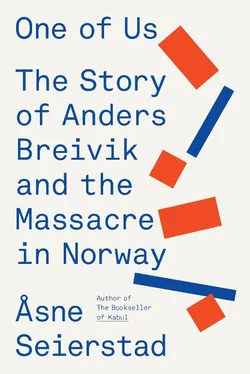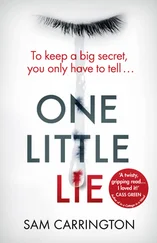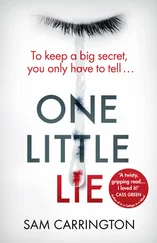‘In what way were you inadequate?’
‘I wasn’t mature enough. I wasn’t mature enough for the task.’
‘What task?’
‘Being a mother.’
She stopped, adjusted her back a little. ‘This thing with Anders has something to do with my own childhood, I expect. The circumstances I grew up in were tough. I’ve never come across anyone who had a worse time. Very poor conditions. Really harsh conditions. I had to look after my mother. Most things were taboo. I don’t know what I can say, without revealing too much. Everything was taboo. Sorry, I’m going to be sick now.’
‘Shall I get a nurse?’
‘Yes, please do.’
A young woman in a white uniform was fetched in from the corridor and she called out to another nurse that the lady in 334 needed to throw up.
Afterwards Wenche sat in bed smiling; the queasiness had gone and she felt a bit stronger. She went on with her account. ‘Well, we always come back to Silkestrå. All those cute little clothes and little presents in their bags when anyone had a birthday. That was how it was then. Lots of birthdays and school parties and nice things like that. And everyday life was much as it usually is, getting up early, school, homework, children’s programmes on TV, baking apple cake, just like ordinary people, nothing to find fault with.’
‘It says in the report that Anders was passive when playing.’
‘Well you have to consider. For one thing, they placed him up there at the centre, with strangers, in a strange setting, so it all goes wrong. I know very well it made him passive being up there. Anders was a self-conscious child. Reserved. And that psychiatrist who made his statement, the nasty one… they came round to the flat too, that psychiatrist or psychologist, to study us, judge us.’
They wanted to observe the bedtime routines in the family, Wenche remarked.
‘And Anders was so neat and tidy, you know. He couldn’t help the fact that he had an orderly mother.’
She took a breath. ‘It wasn’t his fault. I brought the boy up to be like me.’ She gave a tired sigh. ‘I’d said to Anders: we’re going to start a new game here at home. You and I are going to get undressed, and we’ll see who finishes first. I’ll time us, starting now! So I timed us, and Anders won. And there was his neat little pile, with mine beside it, and that was wrong too. And when he got a real psychiatric… psychiatric… psychiatric, no. I can’t find the word. Anyway, you have to get undressed first and then wash your hands, he was very keen on washing his hands, being clean, and then you put on your pyjamas, and then you have some supper and then clear up and so on, and then you wash your hands again. And they presented that as wrong, too.’
She shook her head.
‘What did Anders like best when he was little?’
‘He really liked to be praised when he’d been clever. When we played that undressing game in the evenings and he won, came first, he thought that was great. I could see how much he liked it. How they can say the opposite, that there was something wrong with the boy, I can’t understand.’
‘What did he play when he was at home?’
‘We played Lego, we did. Playmobil. We played everything there was. Duplo, Taplo, Poplo, you name it,’ she laughed.
‘In the report from the Centre for Child Psychiatry it says that on the one hand you bound him to you, and the two of you slept close together in the same bed, while on the other you could suddenly reject him and say hateful things to him.’
‘I still haven’t finished,’ she said, feeling for the thin plastic sick bag that lay close to hand.
‘I’ll go and get a nurse.’
‘Well if it happens, it happens,’ said Wenche.
Once the nausea had subsided, Wenche wanted to go on.
‘There has to be room for… room for… what’s it called again? There has to be room for – reconciliation, that’s it. Time for reconciliation,’ she said slowly, stressing every syllable. ‘We can’t change anything, after all. So let things rest. Try to understand instead. There’s a lot still to find out.’
‘For you too?’
‘Yes, for me too.’
‘Have you reconciled yourself to Anders’s actions?’
‘I reconciled myself a few months after it happened. I was convinced I’d be able to do it. Perhaps it’s just that I’m a forgiving mother.’
‘Have you forgiven him?’
‘Yes, I have.’
‘What do you think, was he sick or was it a political act?’
‘It was a rational political act. No question. It was unexpected, but perhaps not that unexpected.’
‘What do you mean?’
‘I think we’ll call it a day now. Better for us to follow up later. Now, you go home and think it all through.’ Right at the end, after all the goodbyes and wishes for better days, she said:
‘Well, Anders is content now, anyway. At least that’s what he told me.’
* * *
The nurse came in with painkillers. ‘Oh, that’s sweet of you,’ said Wenche Behring Breivik to the young girl in white. ‘Would you mind closing the window too? I’m freezing.’
The nurse closed the window, which had been on the latch, letting in the cold of the March day outside. Spring was taking its time. There was a hint of sleet in the air.
On the windowsill of room 334 there was a pink plastic orchid, still in its crisp cellophane packet. It was getting late. The scrap of sky that Wenche could see when she rested her head on the pillow was growing darker. From there she could see the tiny snowflakes, so light that they seemed to take forever to reach the ground.
* * *
Wenche Behring Breivik died eight days later.
She passed away just before Easter. Her son sought permission to attend her funeral. His application was refused.
He had no contact with his father. Nor with his sister. None of his friends had written to him. Many of his closest friends said they had put him behind them. ‘I’m through with Anders,’ said one. And yet hardly a day passed without them thinking of him. Many of them were troubled by feelings of guilt. Should they have realised?
He had hardly anyone to correspond with any more. In the letters that he did receive, most of the words were blacked out. He replied to them with letters he knew would be censored. The correspondence petered out. The letters stopped coming. His prison cell had not become the writer’s workshop he had planned. Some journalists asked for interviews. He visualised the queue of reporters eager to interview him, dreaming of being the first . But he did not want to meet any of them. If he gave an interview he imagined the queue evaporating, interest tailing off. He would no longer be in demand.
He did respond to one of the interview requests. The request arrived just after the trial He spent a long time thinking about whether to write back. Only a year later, in June 2013, did he decide to answer. The journalist had included a stamped addressed envelope. He located it among his other documents, where he had been keeping it for almost a year. He elected to start on a jovial note.
Dear Åsne! :-)
I have been following your career with great interest since 2003. I both respect and admire you for your mentality, competence and intelligence, which afford you opportunities that almost all women and most men can only dream of ;-)
Flattery was the style he adopted. ‘What’s so unique about you is that you achieved so much at such a young age, and in addition to that are so beautiful! ;-)’ he wrote.
Then he described the strategy he had employed throughout the trial. Double psychology, he called it. Calculated deception, to put it simply. A necessary evil to counter the propaganda and deceit of the other parties. And it was for this reason that the full truth about his operation had not come out. He wrote that ever since the trial he had wanted to be open about everything, but that he had been prevented from expressing himself since the stricter regime was implemented after the verdict.
Читать дальше












